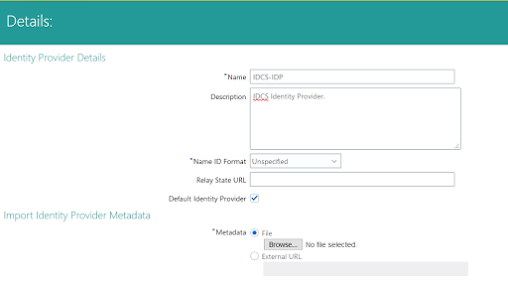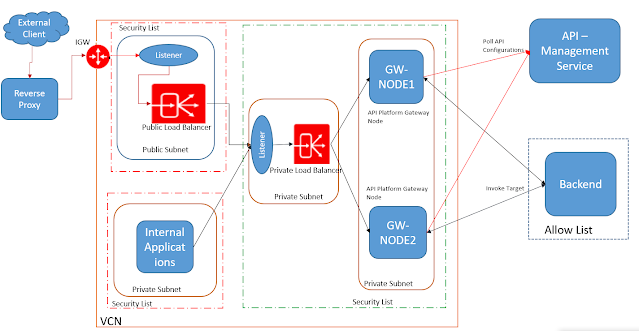Maven Setup:
First we need to download and install Maven.
- Download maven from this site - https://maven.apache.org/download.cgi
- Unzip the downloaded file.
- Add MAVEN_HOME system variable / Environment Variable
- MAVEN_HOME = C:\Vijaya\SW\Maven\apache-maven-3.8.6
- Add Maven bin folder to PATH variable.
- PATH = C:\Vijaya\SW\Maven\apache-maven-3.8.6/bin
- Run mvn --version to check the setup
Update local repository:
We need to set up a local maven repository for deploying applications using maven.
First we need to install SOACS on our local machine. Download the SOA installer jars from Oracle and install it on a local machine.
Update Local Repository with SOA plugins: Follow the below steps to configure a local repository with SOA plugins.
- Go to the following Oracle installation path .
cd C:\Oracle\Middleware\Oracle_Home\oracle_common\plugins\maven\com\oracle\maven\oracle-maven-sync\12.2.1
- Execute the following maven commands.
mvn install:install-file -Dfile=oracle-maven-sync-12.2.1.jar -DpomFile=oracle-maven-sync-12.2.1.pom
mvn com.oracle.maven:oracle-maven-sync:push -DoracleHome=C:/Oracle/Middleware/Oracle_Home -DoverwriteParent=true
mvn com.oracle.maven:oracle-maven-sync:push -Doracle-maven-sync.oracleHome=C:/Oracle/Middleware/Oracle_Home
mvn com.oracle.maven:oracle-maven-sync:push -Doracle-maven-sync.oracleHome=C:/Oracle/Middleware/Oracle_Home -Doracle-maven-sync.testonly='true'
mvn archetype:crawl -Dcatalog=C:\Users\vijaya\.m2\archetype-catalog.xml
Create a Maven SOA Project and update the POM files.
Use the following POM files as a template.
Application POM:
<project xmlns:xsi="http://www.w3.org/2001/XMLSchema-instance" xmlns="http://maven.apache.org/POM/4.0.0" xsi:schemalocation="http://maven.apache.org/POM/4.0.0 http://maven.apache.org/xsd/maven-4.0.0.xsd">
<modelversion>4.0.0</modelversion>
<groupid>SampleApplicationSOA</groupid>
<artifactid>SampleApplicationSOA</artifactid>
<version>1.0</version>
<packaging>pom</packaging>
<modules>
<!--Add project modules-->
<module>SampleProject1</module>
<module>SampleProject2</module>
</modules>
</project>
Project POM:
<?xml version="1.0" encoding="UTF-8" ?>
<project xsi:schemaLocation="http://maven.apache.org/POM/4.0.0 http://maven.apache.org/xsd/maven-4.0.0.xsd"
xmlns="http://maven.apache.org/POM/4.0.0" xmlns:xsi="http://www.w3.org/2001/XMLSchema-instance">
<modelVersion>4.0.0</modelVersion>
<groupId>SampleProject1</groupId>
<artifactId>SampleProject1</artifactId>
<version>1.0</version>
<packaging>sar</packaging>
<parent>
<groupId>com.oracle.soa</groupId>
<artifactId>sar-common</artifactId>
<version>12.2.1-3-0</version>
<relativePath></relativePath>
</parent>
<properties>
<!-- These parameters are used by the compile goal -->
<scac.input.dir>${project.basedir}/SOA/</scac.input.dir>
<scac.output.dir>${project.basedir}/target</scac.output.dir>
<scac.input>${scac.input.dir}/composite.xml</scac.input>
<scac.output>${scac.output.dir}/out.xml</scac.output>
<scac.error>${scac.output.dir}/error.txt</scac.error>
<scac.displayLevel>1</scac.displayLevel>
<composite.name>${project.artifactId}</composite.name>
<composite.revision>1.0</composite.revision>
<composite.partition>default</composite.partition>
<overwrite>true</overwrite>
<forceDefault>true</forceDefault>
<regenerateRulebase>false</regenerateRulebase>
<keepInstancesOnRedeploy>false</keepInstancesOnRedeploy>
<scatest.result>${scac.output.dir}/testResult</scatest.result>
<input>${project.artifactId}</input>
</properties>
<build>
<plugins>
<!-- Plugin to read the propery file</file>-->
<plugin>
<groupId>org.codehaus.mojo</groupId>
<artifactId>properties-maven-plugin</artifactId>
<version>1.0-alpha-2</version>
<executions>
<execution>
<phase>initialize</phase>
<goals>
<goal>read-project-properties</goal>
</goals>
<configuration>
<files>
<file>${build.properties.file}</file>
</files>
</configuration>
</execution>
</executions>
</plugin>
<!-- Plugin to replace the tokens </file>-->
<plugin>
<groupId>com.google.code.maven-replacer-plugin</groupId>
<artifactId>replacer</artifactId>
<version>1.5.3</version>
<executions>
<execution>
<id>replace-schema-file</id>
<phase>prepare-package</phase>
<goals>
<goal>replace</goal>
</goals>
<configuration>
<file> ${scac.input.dir}/wsm-assembly.xml</file>
<replacements>
<replacement>
<token>@@TARGET_SERVER1@@</token>
<value>${TARGET_SERVER1}</value>
</replacement>
<replacement>
<token>@@TARGET_SERVER2@@</token>
<value>${TARGET_SERVER2}</value>
</replacement>
</replacements>
</configuration>
</execution>
</executions>
</plugin>
<plugin>
<groupId>com.oracle.soa.plugin</groupId>
<artifactId>oracle-soa-plugin</artifactId>
<version>12.2.1-3-0</version>
<configuration>
<compositeName>${project.artifactId}</compositeName>
<composite>${scac.input}</composite>
<sarLocation>${scac.output.dir}/sca_${project.artifactId}_rev${project.version}.jar</sarLocation>
<serverUrl>${SOACS_HOST_NAME}</serverUrl>
<user>${SOACS_USER_NAME}</user>
<password>${SOACS_PASSWORD}</password>
<!-- Note: compositeRevision is needed to package, revision is needed to undeploy -->
<compositeRevision>${composite.revision}</compositeRevision>
<revision>${composite.revision}</revision>
<scacInputDir>${scac.input.dir}</scacInputDir>
<appHome>${project.basedir}/..</appHome>
<oracleHome>${ORACLE_HOME}/soa</oracleHome>
<input>${input}</input>
</configuration>
<extensions>true</extensions>
</plugin>
</plugins>
</build>
<!-- To download the plugins from Oracle maven repo </file>-->
<repositories>
<repository>
<name>OracleMaven</name>
<id>maven.oracle.com</id>
<url>https://maven.oracle.com</url>
</repository>
</repositories>
<pluginRepositories>
<pluginRepository>
<name>OracleMaven</name>
<id>maven.oracle.com</id>
<url>https://maven.oracle.com</url>
</pluginRepository>
</pluginRepositories>
</project>
Note: If we are using MDS resources (wsdl/xsd) then we need to provide the local mds path details for compilation and packaging.
Use the following adf-config.xml file
<?xml version="1.0" encoding="windows-1252" ?>
<adf-config xmlns="http://xmlns.oracle.com/adf/config" xmlns:adf="http://xmlns.oracle.com/adf/config/properties"
xmlns:sec="http://xmlns.oracle.com/adf/security/config">
<adf:adf-properties-child xmlns="http://xmlns.oracle.com/adf/config/properties">
<adf-property name="adfAppUID" value="XxScmSDTLightAppSOA-8435"/>
</adf:adf-properties-child>
<sec:adf-security-child xmlns="http://xmlns.oracle.com/adf/security/config">
<CredentialStoreContext credentialStoreClass="oracle.adf.share.security.providers.jps.CSFCredentialStore"
credentialStoreLocation="../../src/META-INF/jps-config.xml"/>
</sec:adf-security-child>
<adf-mds-config xmlns="http://xmlns.oracle.com/adf/mds/config">
<mds-config xmlns="http://xmlns.oracle.com/mds/config">
<persistence-config>
<metadata-namespaces>
<namespace path="/apps" metadata-store-usage="mstore-usage_2"/>
<namespace path="/soa/shared" metadata-store-usage="mstore-usage_3"/>
</metadata-namespaces>
<metadata-store-usages>
<metadata-store-usage id="mstore-usage_2">
<metadata-store class-name="oracle.mds.persistence.stores.file.FileMetadataStore">
<property name="metadata-path" value="${soamds.apps.home}"/>
</metadata-store>
</metadata-store-usage>
<metadata-store-usage id="mstore-usage_3">
<metadata-store class-name="oracle.mds.persistence.stores.file.FileMetadataStore">
<property name="partition-name" value="seed"/>
<property name="metadata-path" value="${soa.oracle.home}/integration"/>
</metadata-store>
</metadata-store-usage>
</metadata-store-usages>
</persistence-config>
</mds-config>
</adf-mds-config>
</adf-config>
${soamds.apps.home} : Pass local MDS path while running Maven command.
${soa.oracle.home} : Pass either local MDS or SOA install directory path where seeded resources are present.
Maven Command to Deploy:
mds_path=$(pwd)/soamp/mds
MIDDLEWARE_HOME_SOA= C:\Oracle\Middleware\Oracle_Home\ (SOA installation path)
mvn -Dbuild.properties.file=${property} -Dsoa.oracle.home=${MIDDLEWARE_HOME_SOA}/soa
-Dsoamds.apps.home=${mds_path} pre-integration-test
In case if we have to use an SSL port for the deployment and if we need to use a custom trust store to connect then we can use the following maven command.
mvn -Dbuild.properties.file=${property} -Dsoa.oracle.home=${MIDDLEWARE_HOME_SOA}/soa -Dsoamds.apps.home=${mds_path} -Djavax.net.ssl.keyStoreType=JKS -Djavax.net.ssl.trustStore=${trustStoreFile} -Djavax.net.ssl.trustStorePassword=**** -Djavax.net.ssl.keyStore=${trustStoreFile} -Djavax.net.ssl.keyStorePassword=*** pre-integration-test






